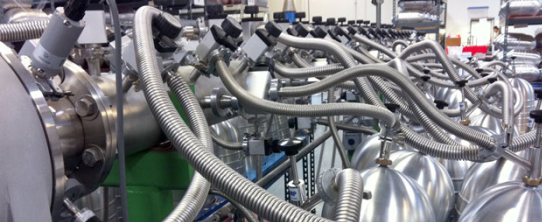New York based biopharmaceutical company, NeoStem, is developing an autologous immunotherapy using patients’ own tumor cells to maximize individuals’ immune system’s ability to identify and eliminate cancer-initiating cells that NeoStem believes are capable of reconstituting and developing new tumors.
Lake Forest, California based Cryoport, Inc. is a world class provider of advanced cryogenic logistics solutions for the life sciences industry, serving markets including cold transport of immunotherapies, stem cells, cell lines, clinical research organizations, vaccine manufacturers and reproductive medicine.
Cryoport’s best-in-class cryogenic logistics solution is providing comprehensive support for NeoStem, Inc.’s. Intus Study to evaluate its lead cancer immunotherapy, NBS20 (USAN = eltrapuldencel-T), a patient-specific targeted cancer immunotherapy candidate for treatment of metastatic melanoma. Cryoport is an important partner to the NBS20 development program as it launches the multi-center trial and provides access to enrolled patients to the cryopreserved, cell-based therapy that could potentially treat the rapid progression of the deadly cancer.
As fore-noted, NeoStem is developing an immunotherapy that uses a patient’s own tumor cells to maximize their immune system’s ability to identify and eliminate cancer-initiating cells (also known as “cancer stem cells”) that are capable of reconstituting or developing new tumors. NeoStem’s proposed therapeutics combine cancer cells harvested from the patient — then purified and irradiated, with specialized immune cells that “educate” the body’s immune cells to destroy cancer-initiating cells from which tumors grow.
The company’s lead drug candidate, NBS20 (USAN: eltrapuldencel-T), an investigational treatment for malignant melanoma, has received Special Protocol Assessment, Fast Track & Orphan Drug Designations from the US Food & Drug Administration (FDA) for its Phase 3 trial, the “Intus Study,” for which the company expects the first patient to be randomized during the present second quarter of 2015.
 “The randomization of the first patient in the pivotal Phase 3 trial for NBS20 represents the achievement of a significant milestone for NeoStem, marking our transformation into a Phase 3 immuno-oncology company. We are now part of a select group of immunotherapy companies at such an advanced clinical development stage,” says Dr. David J. Mazzo, PhD, Chief Executive Officer of NeoStem in a release.
“The randomization of the first patient in the pivotal Phase 3 trial for NBS20 represents the achievement of a significant milestone for NeoStem, marking our transformation into a Phase 3 immuno-oncology company. We are now part of a select group of immunotherapy companies at such an advanced clinical development stage,” says Dr. David J. Mazzo, PhD, Chief Executive Officer of NeoStem in a release.
“We are pleased to take another step in our efforts to demonstrate the efficacy of this patient-specific therapy in the hope of improving long-term survival of patients with metastatic melanoma, especially given approval of recent therapies that have yielded strong response rates without demonstrating substantial impact on survival,” says Dr. Robert Dillman, Vice President, Oncology of NeoStem and founder of the NBS20 technology.
NeoStem’s immunotherapeutic approach is a platform technology that the company believes could be expanded into other indications, such as hepatocellular carcinoma and other immune responsive tumor types. In addition to metastatic melanoma, the platform technology on which NBS20 is based is potentially applicable across multiple solid tumor types, including advanced lung, colon, kidney, ovarian and hepatocellular carcinomas, and glioblastoma multiforme — indications that collectively lead to more than 200,000 deaths in the United States each year.
See more on that aspect at:
http://bit.ly/1zOlVQa
Metastatic Melanoma
Melanoma, which originates in pigment-producing cells known as melanocytes, is the most lethal form of skin cancer. Melanoma is often caused by unrepaired DNA damage to skin cells from UV radiation. Patients who have progressed to stage IV melanoma have a cancer that has metastasized to distant sites in the body such as the lymph nodes, lungs, liver or brain.
As a result, advanced melanoma is exceedingly difficult to treat, with a five-year survival rate of approximately 15 percent. There are 20,000 estimated new cases of metastatic melanoma, and an estimated 10,000 deaths from metastatic melanoma, each year in the United States.
Treatments for stage IV melanoma are typically directed at slowing the growth of the cancer and prolonging survival. Current treatment options include radiation, chemotherapy, surgical resection, immunotherapy, or a combination approach. Unfortunately, current therapies have had limited impact on long-term survival for most patients. Even with the newer targeted therapies (anti-checkpoint inhibitors and specific enzyme inhibitors), half of patients with metastatic melanoma still die within 13 to 17 months from the start of such treatment. Administering certain anti-melanoma drugs at higher doses or in combinations may be more effective, but often results in more severe side effects.
The Intus study is a multi-national, randomized, double-blind, placebo-controlled Phase 3 clinical trial in which stage III recurrent or stage IV metastatic melanoma patients will be randomized in a 2:1 ratio to receive either NBS20 (autologous dendritic cells loaded with antigen from self-renewing, proliferating autologous tumor cells in GM-CSF) or a control treatment (peripheral blood mononuclear cells obtained from apheresis product in GM-CSF). The study is expected to randomize 250 eligible patients across approximately 50 sites internationally (US, Canada, Australia, New Zealand and, potentially, select countries of the EU); each patient will receive subcutaneous injections once weekly for three consecutive weeks, and then once monthly for five months.
Intus Phase 3 clinical trial investigating the efficacy of the Company’s patient-specific targeted cancer immunotherapy candidate NBS20 (USAN = eltrapuldencel-T) in patients with stage III recurrent or stage IV metastatic melanoma. The Intus trial has been granted a Special Protocol Assessment (SPA) by the U.S. Food and Drug Administration (FDA), which permits this trial, if successful, to be the sole pivotal trial necessary for registration. The NBS20 development program has also been granted Orphan Drug and Fast Track designations by FDA.
Clinical Overview
NeoStem reports that an early formulation of NBS20 subcutaneously injected in a Phase 2 randomized clinical trial was shown to improve two year overall survival rate in patients with advanced melanoma (recurrent Stage III or Stage IV) to 72 percent compared with 31 percent for control patients treated with only their own tumor cells suspended in granulocyte macrophage colony stimulating factor (GM-CSF) (p=0.007). At two years, survival was 72 percent compared to 31percent for control patients (p=0.007), which was consistent with a previous Phase 2 trial’s findings in which NBS20 demonstrated 73 percent two-year survival in 54 patients, with a median survival of five years.
The report observed that the toxicity profile was favorable, with no grade IV and only one grade III (allergic reaction) event recorded in the study. The allergic reaction was attributed to the granulocyte macrophage colony-stimulating factor (GM-CSF), an FDA-approved immune stimulant used in the final drug formulation. No other significant toxicities were observed in either an earlier single-arm Phase 2 trial or this randomized Phase 2 trial.
Local injection site reactions, such as skin irritation and itching, did occur, but those symptoms were minimal and consisted of mild to moderate local injection site reactions of the type normally associated with injections of GM-CSF (a protein secreted by immune cells that helps stimulate other immune cells to promote immune defenses against disease) that dissipated within hours after the injection. There were also no significant adverse effects on hematopoietic cells or renal function, liver function, or patient performance status.
“At NeoStem, we are dedicated to preserving and enhancing human health through the development of novel cell-based individualized therapies like our lead Phase 3 program in immuno-oncology, the Intus Study, targeting the treatment of late-stage melanoma,” says Dr. Mazzo. “Cryoport plays an important role in NBS20 development by supporting the Intus Study with the cryopreserved delivery of NBS20 to our clinical sites in the United States. They have been instrumental in facilitating trial access to our patients and we welcome the opportunity to further strengthen and expand our relationship with the company as we require additional support.”
“We are pleased to be able to support NeoStem with their efforts in developing innovative cell-based personalized therapies,” says Jerrell Shelton, Chief Executive Officer of Cryoport. “Our validated cryogenic logistics solutions will maintain the integrity of the Intus trial as it advances through the regulatory pathway that has been set by the FDA. We are actively supporting the distribution of NBS20 and will eagerly continue to support NeoStem as it advances its clinical trials.”
NeoStem is dedicated to pursuit of preservation and enhancement of global human health through development of novel cell-based personalized medicine therapeutics to prevent, treat or cure disease — its stated objective no less ambitious than to transform the future of medicine with innovative cell based therapies while providing development and manufacturing services that drive the industry forward.
NeoStem is developing therapies based on three different platform technologies (immune-oncology, ischemic repair and immunomodulation) with a lead, late-stage (Phase 3, 2 and 2, respectively) clinical program for each. The combination of a rich therapeutics pipeline and an externally recognized in-house center for cell therapy process development and manufacturing has established an organization with unique capabilities for accelerated and efficient product development. One of NeoStem’s goals is to reduce lifetime dependency on pills to a single dose of cells and thereby help society reduce the cost burden of an unsustainable healthcare system.
NeoStem’s corporate vision is of a world in which chronic disease is a problem of the past and patients have the freedom to enjoy a healthier span of life, and the company’s leaders are convinced that cell therapies will be better medicine. For more about that, see: http://www.neostem.com/about/overview/#sthash.hGRwR5Gk.dpuf
Cryoport is a premier provider of cryogenic logistics solutions to the life sciences industry through its purpose-built proprietary packaging, information technology and specialized cold chain logistics expertise. The company provides a complete global frozen shipping service that replaces dry ice as the freezing medium, virtually eliminating risk of cell degradation during frozen transportation. The company uses custom-formulated liquid nitrogen dry vapor shippers to maintain stable temperatures, and are experts in deep-frozen shipping for biological materials claiming the most advanced Logistics Management Platform in the industry.
In providing deep-frozen shipping for the life science community, Cryoport combines the technology of liquid nitrogen dry vapor shippers with what they maintain is most advanced Logistics Management Platform in the industry to replace outdated dry ice shipping.
The Cryoportal Logistics Management Platform provides an advanced web portal for managing frozen shipping logistics, including full carrier integration for up-to-the-minute track and trace to managing all stages of the shipment including ordering, document preparation, and customs clearance, all handled from one portal.
Cryoport Express liquid nitrogen dry vapor shippers are validated to maintain a stable -150° C for 10+ day dynamic shipments. The custom built dry vapor shipper features a LN2 dry shipper for maximum stability, reliability and safe frozen shipping at cryogenic temperatures, providing the highest specimen integrity for high-value frozen biological materials.
Cryoport is the preferred cryogenic logistics solutions partner to the world’s largest shipping companies controlling more than 85 percent of the world’s air shipments. For more information, visit:
http://www.cryoport.com.
For more information on the Intus Study visit:
http://www.theintusstudy.com
or
http://www.clinicaltrials.gov/ct2/show/NCT01875653
Sources:
Cryoport, Inc.
NeoStem
Image Credits:
Cryoport, Inc.
NeoStem


